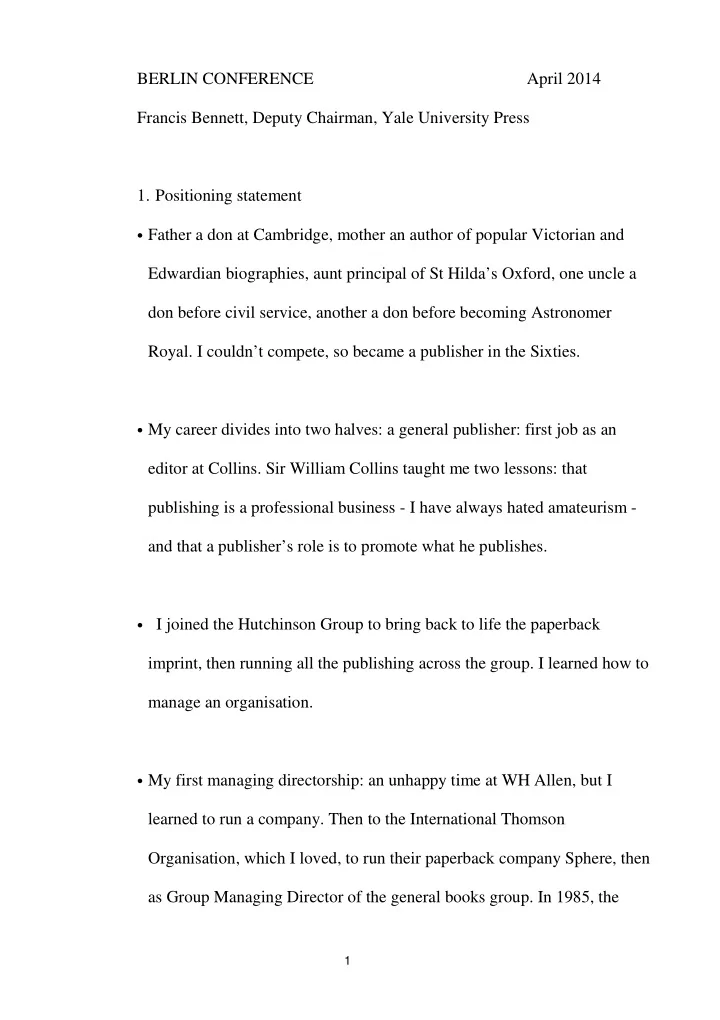

BERLIN CONFERENCE April 2014 Francis Bennett, Deputy Chairman, Yale University Press 1. Positioning statement • Father a don at Cambridge, mother an author of popular Victorian and Edwardian biographies, aunt principal of St Hilda’s Oxford, one uncle a don before civil service, another a don before becoming Astronomer Royal. I couldn’t compete, so became a publisher in the Sixties. • My career divides into two halves: a general publisher: first job as an editor at Collins. Sir William Collins taught me two lessons: that publishing is a professional business - I have always hated amateurism - and that a publisher’s role is to promote what he publishes. • I joined the Hutchinson Group to bring back to life the paperback imprint, then running all the publishing across the group. I learned how to manage an organisation. • My first managing directorship: an unhappy time at WH Allen, but I learned to run a company. Then to the International Thomson Organisation, which I loved, to run their paperback company Sphere, then as Group Managing Director of the general books group. In 1985, the 1
new chief executive of ITO sold the group to Penguin, the first of the consolidations. • I set up Book Data and became an electronic information publisher. Why? Growth in title output meant selection by booksellers required much more title information than was available. The official database old- fashioned and amateur. We revolutionised the idea and value of title data and created the full title record now used across the world. • We sold the company in 2002. I am now Deputy Chairman of Yale University Press. An academic publisher! • Career themes: a commitment to professionalism and a questioning of orthodoxies. 2. My vision of the future of academic publishing (2020) The trends which will force change on university presses: • University education is becoming a global tradable commodity, aka the knowledge economy. Universities must compete in world market, with enormous rewards for the successful. The digital revolution creates 2
opportunities for universities to go out to pupils rather than pupils going to the universities. This will have a direct impact on academic publishers. • Speed of change makes the current academic publishing model out of date. The world is changing rapidly but the academic publishing process remains conservative and unresponsive to changes around it. Communication is instant. Market expectations are immediate. The academic publishing process must respond by creating a new model. The present system is too slow at experimenting and adopting new models - and will be left behind if it doesn’t change. 2. Academic publishing in 2020. A new world of conveying knowledge to the market. 1. Subsidies will have gone. They keep alive practices that, if exposed to the market place, would collapse: too many books, very high prices, low sales, often unreadable. The excuse: this is learning and the press is non- profit (but isn’t making enough margin to cover rising costs). ‘Deficits don’t matter.’ The change: the subsidy (annually millions of dollars across 90+ university presses in the US) will be needed to promote and develop e-versions of the university to a global market. University presses will provide key support for that expansion by promoting the 3
university brand and learning scope in the market place. The presses will have to survive in a commercial environment. 2. Monographs will be digital-publications, readable on different devices, part of what I call ‘knowledge islands in an ocean of learning’ or learning clusters, based on global standards, all aimed precisely at their markets, text, bibliography, indexes, sources, all instantly discoverable and accessable, updated regularly, with changes, developments, comments etc. The future is interconnected data worlds of knowledge and research and resources and sources, globally available, aimed at specialist markets, using the university branding as the hallmark of subject quality. Publishers as curators of content, finding ways to alert the market. A totally new learning product with new collaborations (see MUSE, academic presses and research libraries for online distribution - but competition for ownership of distribution channels - who owns the routes that connect users to content and how effective are they. 3. Printed academic books will continue: university presses are going to have to move into the general market place and produce books with ‘impact’ for which there is a real market at prices that are reasonable. The printed book with a very high price and a minute readership will vanish. 4
4. Open access will have been sorted out and agreed, with a global standard agreed. 5. Peer review will be progressive (red, amber, green) to meet speed demands. (As we know it now, it will have disappeared).In an age when global communication is instant, the idea of holding up publications while academics give their verdict is hard to justify. But some form of evaluation must remain. (Red, amber, green). The social sciences and humanities, why not post an unreviewed text on the Internet as ‘work in progress?’ In other words, establish a new standard the old one is out of date. 6. Universities presses will play an important but very different role in a highly competitive e-learning universe as brands supporting the extended reach of their owners. But only those presses that accept that their traditional methods must change will survive. 7. The new knowledge creation and dissemination infrastructure will be the result of true dialogue between all participants and a real look at the roles each participant plays and how they will have to change. 5
Recommend
More recommend